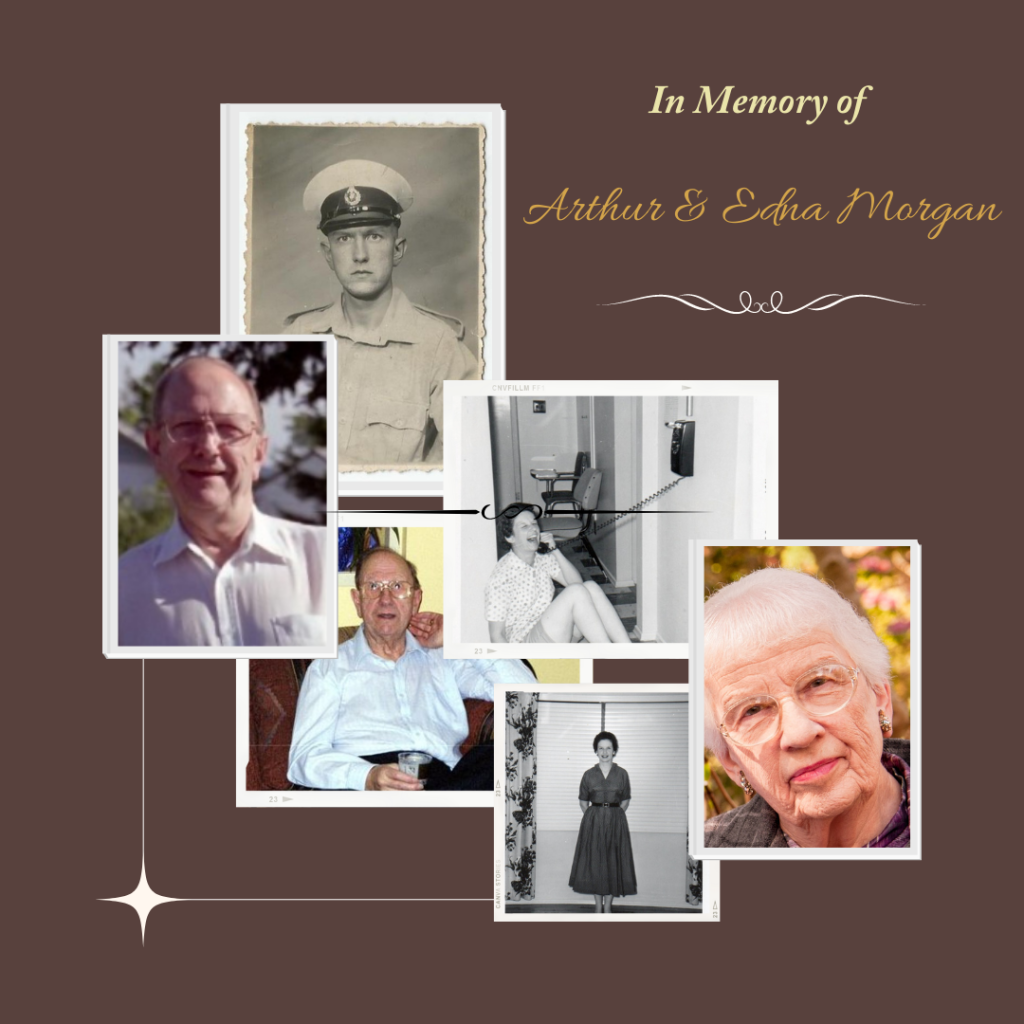
This year marked the 10th anniversary of my dad’s passing. A tsunami of grief slammed against my soul and spirit as I pondered the paradox of that day. How could a decade have passed so fast? In the next thought, I realized every second of that day remained intact in my memory. It was a bittersweet feeling, and I spent September 24, 2021, in a state of melancholic reflection.
Fifteen days later, on October 9, 2021, my mom passed away. She’d suffered from dementia for decades, and spent the last two years of her life in a care facility. Her death was both expected and a shock. It wasn’t the dementia that took her – she had a stroke. She went from being stable to dying in less than twelve hours. The same feelings rushed to the forefront. It was another paradoxical day.
My parents were born two years apart. Dad in 1931 and mom in 1929. They were also born with an ocean and half a continent between them. Dad was British, born in Manchester, England. Mom was born in a farmhouse near the town of St. Boswells, Saskatchewan. They came from very different backgrounds. Dad immigrated to Canada in 1963. The chances of their paths crossing was slim indeed. They met at a square dance club in Calgary, Alberta, for lessons. It was something they both loved to do. That interest never died – they resumed square dancing in their senior years.
Dad was the last of his siblings. Mom’s younger sister is still living, though she’s fighting the same battle my mom did. My aunt is last of her siblings. Both my parents represent a generation born after the horrors of the Great War. I’m writing this blog to acknowledge my parents’ lives, and the lives of the Silent Generation. People born from 1928 to 1945 faced many challenges, obstacles, and hardships.
My parents grew up in an era without electricity. Houses were dimly lit by oil lamps and candlelight. It was also an era without cars, trucks, SUVs, planes, boats or a space race. My mom and dad walked to school. They differed greatly from the schools we have today. Mom attended a one-room schoolhouse in the middle of the prairies. They wrote with chalk on slates and then dipped pens in inkwells, and wrote longhand. My dad didn’t share too much about his school days, but they had headmasters instead of principals. Levels replaced grades. Both of my parents told stories of small rooms heated by either wood or coal stoves. The strap or paddle were used to discipline misbehaving students. Horses, wagons, trollies and steam engines were the mode of travel when they were young. Long distance travel occurred aboard passenger ships.
Born during the Great Depression, my parents grew up learning how to make do. They were children when WWII began. Each experienced the war years in different ways. My mom was on the farm, and she told us stories of having to have the blackout curtains in place by a certain hour. Ration cards were the only way to get things they weren’t able to provide for themselves on the farm. Those who lived on farms were fortunate compared to those who lived in big cities. They were self-sufficient in feeding themselves and had access to water through wells.
My dad was one of the child evacuees during WWII in Britain. I didn’t know about this part of his childhood. One Christmas, I bought him a book. It was a biography about child evacuees. I thought he would find it fascinating because he read a lot about the war. Instead, it brought up a lot of terrible memories my dad had buried. He shared very little, but enough for me to piece a few things together. Dad rode a steam train to a rural part of England. He withheld the name, but found himself on a farm. He was one of three boys evacuated from the bigger cities. The owners of the farm used these children as slave labour. Dad said there was never enough food or proper lodging. He wouldn’t elaborate further.
As a teenager, dad signed up with the Royal Marines and spent several years serving aboard different navy ships. He also worked as a bobby (police officer) on the streets of Manchester. He was married young and had a son. That marriage fell apart, and that was the catalyst for immigrating to Canada. After a few months of working odd jobs, Dack’s Shoes hired him to sell “quality leather shoes for men.” Dad worked for that company until he retired at 64.
Members of the Silent Generation faced a lot of adversity and trauma growing up. They rarely spoke about the past. Their experiences forged a strong work ethic, a frugal use of money, gratitude for the small things, and resiliency. Many despised credit or used it as little as possible. They were very resilient when faced with challenges. Their word was their bond. This was the generation that worked for one or two employers until retirement. Employers valued their workforce and their employees were loyal.
Women often stayed at home to raise children while husbands brought home the wages. That’s the way it was with my parents. My dad’s wage was modest. When we were little, there were many meals made with organ meats: heart, liver, kidney, and tongue. They were the cheapest cuts of beef. On the farm, they used every part of an animal for food, so this was a normal for my mom. I’m sure it took my dad a wee bit of getting used to, but he was a meat and potatoes man and soon adjusted. To this day, I will not eat any organ meat except for fried chicken livers and beef kidney in steak and kidney pie. I won’t go into detail about the cow tongue sandwiches I took to school and threw in the garbage can. That says it all. We also ate hamburger, steak, and chicken as we got older. Turkey was for Christmas and ham was for Easter.
The Silent Generation saw the rapid advancement of technology. Kerosene lamps replaced by electricity. Oil and Natural Gas furnaces replaced wood and coal stoves. The automobile’s horsepower engines replaced horses. Booking passage on ships changed to tickets for airplanes flying 30,000 feet in the air. The abacus went into antiquity with the invention of the calculator. The same fate awaited typewriters, once computers evolved. Black-and-white TV sets with bunny ears and then colour TV replaced radio shows. Even music changed from big band to rock-and-roll.
My mom loved Elvis and Boney M. Once VCR players replaced movies, my dad was out of his comfort zone. Answering machines were an enigma. After a power outage, he called me to report a light was flashing. He thought it was about to explode. I had to go out to the house and reset the VCR’s clock. The internet was the dividing line between this generation and mine. My parents could not get their heads around it or computers and outright refused to learn. Who could fault them? I couldn’t, though I may have had my impatient moments as a teenager.
I am now 53 years old and feeling like an adult orphan. My parents’ lives mattered and they will live on in my memories. The work ethic and values I learned as a child have been invaluable. It’s my responsibility as a member of Generation X to pass them on.
Each generation must learn from those that came before. History is important. The lessons the previous generations have taught us are valuable. If we forget those lessons, we risk repeating their mistakes. With our current technology levels, if we repeat the dire mistakes or worse… we risk losing who we are as human beings.

What a beautifully written piece. Thank you so much for sharing a bit of history about your family with us.
LikeLiked by 1 person